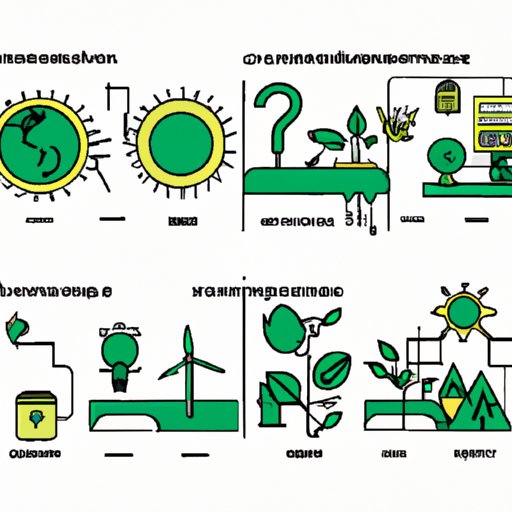Introduction
Environmental science is a multidisciplinary field that seeks to understand the complex interactions between humans and their environment. It involves the study of natural processes and the impact of human activities on these processes, as well as the evaluation of potential solutions to global environmental issues.
In this article, we will explore what environmental science is and look at the core concepts of the field. We will also examine the impact of climate change, investigate solutions to global environmental issues, and discuss the role of environmental scientists in society.
Exploring the Core Concepts of Environmental Science
What is environmental science? According to the American Institute of Biological Sciences (AIBS), it is “the scientific study of the interactions among physical, chemical, and biological components of the environment.” In other words, environmental science examines how human activities affect our planet and how we can mitigate their negative impacts.
At its core, environmental science is concerned with understanding the interconnectedness of human activity and the environment. It investigates how people use and interact with the environment and how these activities affect ecosystems and their components. For example, environmental science looks at the effects of pollution on air and water quality, the impacts of deforestation on biodiversity, and the consequences of overfishing on marine life.
Environmental science also studies how human activities influence climate change. Climate change refers to long-term changes in the Earth’s climate due to increased concentrations of greenhouse gases in the atmosphere. The main culprit behind climate change is human activities such as burning fossil fuels, deforestation, and industrial agriculture.

Examining the Impact of Climate Change
Global warming is one of the most pressing issues facing the world today. According to the Intergovernmental Panel on Climate Change (IPCC), average global temperatures have risen by 1.1 degrees Celsius since the pre-industrial era. As temperatures continue to rise, so do sea levels, resulting in flooding, erosion, and habitat loss.
Climate change has far-reaching impacts on biodiversity. A recent study published in Nature found that climate change is already having an effect on species around the world, from butterflies and frogs to coral reefs and polar bears. As temperatures continue to rise, more species are likely to experience declines in population size or range.
Adaptation strategies for climate change include reducing emissions, conserving energy, and investing in renewable energy sources. These strategies aim to reduce the impacts of climate change and help societies become more resilient to its effects.

Examining Solutions to Global Environmental Issues
Sustainable development is one of the most important solutions to global environmental issues. Sustainable development seeks to meet the needs of current generations without compromising the ability of future generations to meet their own needs. This includes reducing emissions, conserving resources, and protecting ecosystems.
Renewable energy sources such as solar, wind, and geothermal are key components of a sustainable future. Investing in renewable energy sources helps to reduce emissions and provides a clean, renewable source of energy. Additionally, investing in renewable energy sources creates jobs and boosts local economies.
Reforestation and conservation are also important solutions to global environmental issues. Reforestation helps to restore damaged ecosystems and provides habitats for wildlife. Conservation efforts seek to protect threatened species and their habitats, helping to ensure their survival for future generations.

Looking at the Role of Environmental Scientists in Society
Environmental scientists play a vital role in society by working with governments and communities to address environmental issues. They help to develop policies and regulations to protect the environment, and they work with communities to implement solutions.
Environmental scientists also play an important role in educating others about environmental issues. Through research and public outreach, they can help to raise awareness of environmental issues and encourage people to take action to protect the planet.
Finally, environmental scientists are advocates for environmental protection. They use their knowledge and expertise to speak out against environmental degradation and to call for greater action to protect the planet.
Conclusion
This article has explored the core concepts of environmental science and examined how human activities affect the planet. We have looked at the impacts of climate change, investigated solutions to global environmental issues, and discussed the role of environmental scientists in society.
In conclusion, environmental science is a multidisciplinary field that seeks to understand the interconnectedness of human activity and the environment. Environmental scientists play a vital role in society by advocating for environmental protection and educating others about environmental issues. By investing in renewable energy sources, conserving resources, and protecting ecosystems, we can ensure a healthy planet for future generations.
(Note: Is this article not meeting your expectations? Do you have knowledge or insights to share? Unlock new opportunities and expand your reach by joining our authors team. Click Registration to join us and share your expertise with our readers.)
